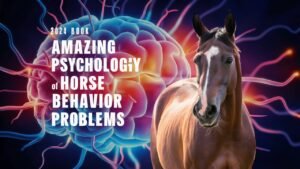“Explore ‘The Psychology of Horse Behavior Problems’ to understand the underlying mental and emotional factors affecting equine behavior. Learn how psychological insights can help address and resolve common issues in horse behavior effectively.”
Introduction

Understanding horse behavior can be as complex as it is rewarding. Many horse owners encounter behavioral issues that can be both perplexing and challenging. To effectively address these problems, a solid grasp of equine psychology is crucial. By delving into the underlying causes and employing appropriate strategies, you can improve your horse’s behavior and strengthen your bond.
Understanding Horse Behavior
Natural Instincts and Social Structures
Horses are inherently social animals with a strong herd instinct. Their behavior is deeply influenced by their natural instincts and social structures. In the wild, horses live in herds with complex social hierarchies, where communication plays a key role in maintaining harmony.
Herd Dynamics
In a herd, horses establish pecking orders and use body language to communicate. Understanding these dynamics can help in interpreting your horse’s behavior. For instance, a horse’s stance, ear position, and vocalizations all convey different messages.
Communication Methods
Horses communicate through a combination of vocal sounds, body language, and even subtle changes in posture. Recognizing these signals can provide insights into your horse’s state of mind and help address behavioral issues more effectively.
Basic Psychological Needs of Horses

Just like any other living creature, horses have fundamental psychological needs that must be met to ensure their well-being.
Physical Exercise
Regular physical exercise is essential for a horse’s mental and physical health. Horses that lack adequate exercise may become restless or develop behavioral problems due to pent-up energy.
Social Interaction
Horses thrive on social interaction, both with other horses and with humans. Isolation or inadequate social contact can lead to issues such as separation anxiety and aggression.
Mental Stimulation
Mental stimulation is crucial for preventing boredom. Engaging activities such as training sessions, puzzles, and varied environments can keep your horse mentally sharp and content.
Common Horse Behavior Problems
Aggression and Dominance Issues
Aggression in horses can manifest in various ways, from nipping to kicking. Understanding the root cause of aggressive behavior is vital for effective management.
Signs and Causes
Common signs of aggression include pinned ears, bared teeth, and a tense body posture. Causes can range from dominance struggles to pain or discomfort.
Managing Aggressive Behavior
Addressing aggression often involves establishing clear boundaries and consistent handling practices. Training techniques that emphasize respect and control can help mitigate aggressive tendencies.
Separation Anxiety
Separation anxiety occurs when a horse becomes distressed when separated from companions or their familiar environment.
Symptoms and Triggers
Symptoms of separation anxiety may include excessive whinnying, pacing, or attempting to escape. Triggers can include changes in routine or isolation from other horses.
Strategies for Management
Managing separation anxiety involves gradual desensitization and creating positive associations with being alone. Ensuring your horse has adequate mental stimulation and a comfortable environment can also help.
Fear and Phobias
Horses can develop fears and phobias towards specific objects, environments, or situations.
Identifying Fears
Identifying fears involves observing your horse’s reactions to certain stimuli. Signs of fear can include a heightened state of alertness, avoidance behavior, or even panic.
Desensitization Techniques
Desensitization involves gradually introducing the feared stimulus in a controlled manner, allowing the horse to acclimate without becoming overwhelmed. Positive reinforcement during this process can encourage a more relaxed response.
Behavioral Problems During Training

Training issues can arise from various sources, including misunderstandings, lack of consistency, or physical discomfort.
Common Issues
Common training problems include resistance to commands, refusal to perform tasks, or displays of frustration. Identifying the root cause is key to addressing these issues.
Solutions and Training Tips
Effective training solutions involve clear communication, patience, and positive reinforcement. Adapting training techniques to suit your horse’s learning style can also improve outcomes.
Psychological Theories Applied to Equine Behavior
Behavioral Conditioning
Behavioral conditioning plays a significant role in shaping a horse’s behavior.
Positive Reinforcement
Positive reinforcement involves rewarding desired behaviors to encourage their repetition. This can include treats, praise, or additional playtime.
Negative Reinforcement
Negative reinforcement involves removing an aversive stimulus when the desired behavior occurs. This method requires careful application to avoid creating fear or anxiety.
The Role of Genetics
Genetics can influence a horse’s temperament and behavior. Certain breeds may exhibit specific traits that affect their behavior patterns.
Breed-Specific Traits
Different breeds have varying tendencies. For example, some breeds are known for their calm demeanor, while others may be more excitable or spirited.
Hereditary Behavior Tendencies
Inherited traits can affect a horse’s response to training and handling. Understanding these tendencies can help in tailoring your approach to better suit your horse’s needs.
The Impact of Environment
The environment plays a crucial role in a horse’s behavior. Factors such as stable conditions, housing, and external stressors can significantly influence behavior.
Stable Conditions
A well-maintained stable with adequate space, ventilation, and cleanliness contributes to a horse’s overall well-being. Poor stable conditions can lead to stress and behavioral issues.
External Stressors
External factors such as weather changes, loud noises, or unfamiliar environments can impact a horse’s behavior. Minimizing these stressors and providing a stable routine can help reduce anxiety and improve behavior.
Addressing and Correcting Behavioral Issues

Professional Help vs. Self-Management
Deciding whether to seek professional help or manage behavioral issues on your own depends on the severity of the problem.
When to Consult a Professional
Professional help may be necessary for severe or persistent behavioral issues that are beyond your ability to manage. Equine behaviorists or trainers can offer specialized knowledge and techniques.
DIY Methods for Behavior Correction
For less severe issues, self-management techniques such as consistent training, positive reinforcement, and environmental adjustments can be effective. Keeping detailed records of your horse’s behavior and progress can also aid in developing a tailored approach.
Building a Positive Relationship with Your Horse
A strong, positive relationship with your horse can significantly impact behavior.
Trust and Bonding Techniques
Building trust involves spending quality time with your horse, engaging in gentle interactions, and providing consistent care. Trust is the foundation for effective training and behavior management.
Effective Communication Strategies
Effective communication includes understanding and responding to your horse’s signals, maintaining clear cues during training, and ensuring that your horse feels understood and respected.
Long-Term Strategies for Behavioral Improvement
Behavioral improvement requires ongoing effort and consistency.
Consistency in Training
Maintaining a consistent approach to training and handling helps reinforce positive behaviors and prevents confusion. Establishing clear routines and expectations is essential.
Monitoring and Adjusting Strategies
Regularly monitoring your horse’s behavior and making adjustments as needed ensures continued progress. Flexibility in your approach can help address any emerging issues promptly.
Conclusion
Understanding the psychology behind horse behavior problems provides valuable insights into managing and correcting these issues effectively. By addressing the underlying causes and employing appropriate strategies, you can foster a positive relationship with your horse and improve their overall well-being.
FAQs
1. What are some early signs of behavioral problems in horses?
Early signs can include changes in demeanor



